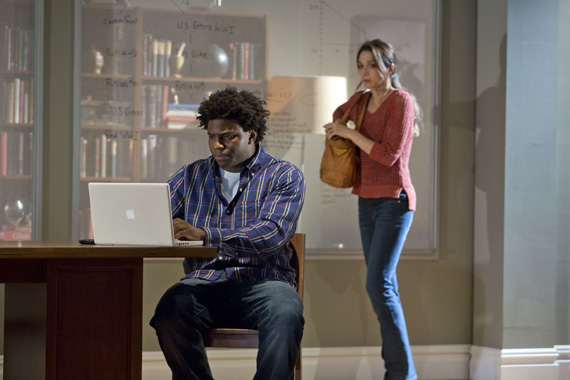Luce

(© Jeremy Daniel)
The mythical figure of Barack Obama continues to mesmerize the theater, most recently in J.C. Lee’s Luce, now receiving its world premiere at Lincoln Center’s Claire Tow Theater. Indeed, it is easy to see the parallels between the titular Luce, a skilled public speaker of African lineage (raised by white parents) and the 44th President of the United States. Lee’s play goes beyond those surface comparisons, however, revealing itself to be a nuanced and deeply provocative examination of privilege and power politics in America. That’s why it is so unfortunate that all of Lee’s difficult legwork is dashed away in the play’s final 10 minutes with an exciting but reductive surprise ending.
Amy (Marin Hinkle) and Peter (Neal Huff) are a well-meaning liberal white couple living in an American suburb. They adopted Luce (Okieriete Onaodowan), a war orphan from the Congo, when he was seven years old. Since then he has developed into a star student and athlete at his charter school. After Luce (pronounced “loose”) pens some disturbing journal entries defending terrorism for a school project, concerned African-American teacher Harriet (a pitch-perfect Sharon Washington) searches his locker and discovers illegal fireworks. Luce believes Harriet has it out for him. He also feels stifled under the oppressive expectations of the people around him: He is like their own personal Obama. Harriet believes Luce is a danger to her and the school, but her need to see him succeed keeps her from alerting her superiors. She would rather deal with his parents directly. Will Luce’s parents side with her or their golden child? Is it possible to threaten someone through a warm and inviting smile? (Yes. Yes it is.)
Practically choking on their own psychobabble, Amy and Peter go back and forth discussing whether something is wrong with their son. They’re so fastidiously considerate, they often switch sides; such is their unfaltering sense of fairness. Hinkle and Huff perfectly capture all the hand-wringing and anxiety of upper-middle-class parents in the thick of secondary education. Their portrayals are so real, it feels like director May Adrales took a big net to 79th Street one day and brought these specimens into captivity for exhibit at the Claire Tow.
Their display case has been masterfully crafted by set designer Timothy R. Mackabee. The sterile but nicely finished cabinetry of a charter school classroom easily transforms into the same for a remodeled kitchen in Luce’s family home as locations alternate. With help from lighting designer Tyler Micoleau, whiteboards dissolve to reveal a foyer and staircase for the home scenes. This is the natural habitat of the overwrought suburban parent.
All of this would make Luce the distinguished zoologist, a man who has been studying his parents for over a decade. Onaodowan plays him with a calculated charm that can switch on a dime to cold intensity. Still, it is intensity delivered through calm words and an icy smile: This guy has learned the fine art of passive aggression; his conduct is unimpeachable. Luce’s scenes with Harriet, brimming with subtext, are thrilling to watch. Luce upends our superficial notions of tribalism and gives us a far more complicated (and truthful) vision of the 21st century. That’s what makes the end of the play so disappointing.
Without giving too much away, in the final scenes Luce transforms from doubt-riddled political thriller to unabashed horror. It’s The Omen or The Bad Seed for a modern audience. Sure, there’s something satisfying about that, too, but it’s not as thought-provoking as it would have been had Lee left his audience with more ambivalence. As it stands, we all know what happened by the end and it scares the crap out of us. But this terror is fleeting compared to the lingering notion that we can never really control how our children turn out, no matter how many Dr. Spock books we read.











